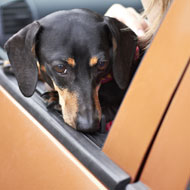
One-quarter of vets treated dogs for heat-related conditions in 2018
The number of reports of animals suffering heat exhaustion has hit a three-year high, according to the RSPCA.
The charity said that last summer was its busiest for three years, having received some 8,290 calls to its emergency hotline about the issue - a five per cent rise from 2017 and a 15 per cent increase from 2016.
In a bid to bring down the numbers, a new campaign has been launched by a cohort of animal charities and veterinary organisations. The Dogs Die in Hot Cars campaign, backed by Battersea Dogs & Cats Home, the BVA and the British Parking Association, aims to raise awareness of the issue and show people that it could have life-changing consequences.
Holly Barber from the RSPCA, who is organising the Dogs Die in Hot Cars campaign, said: “It’s extremely concerning that despite all our campaigning, dog owners are still ignoring and risking their pet’s lives by leaving them alone in cars.”
According to the BVA's Autumn 2018 Voice of the Veterinary Profession survey, a quarter of UK vets saw dogs needing treatment for heat-related conditions last summer. Of these cases, the respondents said that at least one of these cases was for a dog whose condition had been a result of being left in a hot car.
BVA junior vice president Daniella Dos Santos said: “Vets all too often see the unfortunate and sometimes tragic consequences of dogs being left on their own in hot cars, and it’s deeply worrying that some owners are still prepared to take this risk despite the numerous warnings.
“With summer just around the corner, it’s vital that everyone thinks twice about leaving dogs in a hot car even for a short while” ‘not long’ is too long.”
The campaign is supported by Battersea Dogs & Cats Home, Blue Cross, British Parking Association, BVA, Dogs Trust, The Kennel Club, The Mayhew Animal Home, National Animal Welfare Trust, The National Police Chief's Council. PDSA, RSPCA, Scottish SPCA, #TeamOtisUK and Wood Green The Animals Charity.



 The RCVS has announced a new version of its 1CPD mobile app, with enhanced features for veterinary surgeons and veterinary nurses to record their continuing professional development.
The RCVS has announced a new version of its 1CPD mobile app, with enhanced features for veterinary surgeons and veterinary nurses to record their continuing professional development.